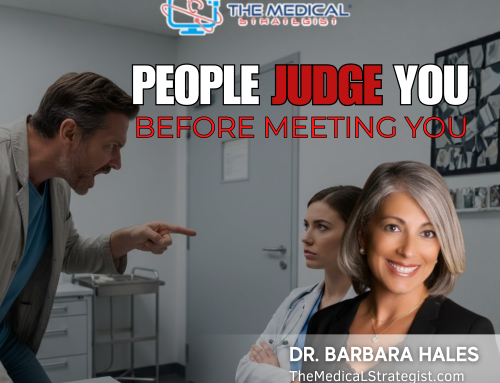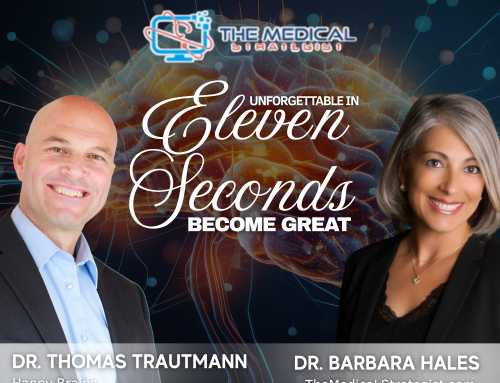Podcast: Play in new window | Download
Subscribe: RSS
In this episode of Marketing Tips for Doctors, host Dr. Barbara Hales sits down with Mickie Kennedy founder of eReleases, to uncover how doctors and medical practices can use public relations (PR) to build credibility, attract patients, and stand out in an increasingly noisy digital landscape.
Mickey shares how earned media—being featured by journalists rather than paying for ads—can be the most powerful form of trust-building. He explains what makes a story newsworthy, how to craft press releases that journalists actually want to cover, and why a strategic approach beats spray-and-pray publicity every time.
If you’ve ever wondered how to get your name in the news without spending a fortune—or how to tell your story in a way that patients and the press will care about—this episode is your PR masterclass.
Key Takeaway:
“When a journalist writes about you, it’s the ultimate form of trust. You can’t buy that kind of credibility.” – Mickie Kennedy
Connect with Mickie Kennedy:
- Website: https://www.ereleases.com
- Free Strategy Video: https://www.ereleases.com/plan
Connect with Barbara Hales:
-
- Twitter: @DrBarbaraHales
- Facebook: facebook.com/theMedicalStrategist
- Business website: www.TheMedicalStrategist.com
- Show website: www.MarketingTipsForDoctors.com
- Email: info@TheMedicalStrategist.com
- YouTube: @barbarahales
- LinkedIn: linkedin.com/in/barbarahales
Books:
TRANSCRIPTION (217)
Welcome and Introduction
Dr. Barbara Hales (00:02)
Welcome to another episode of Marketing Tips for Doctors. I’m your host, Dr. Barbara Hales, and today we have with us Mickie Kennedy. Mickey is the founder of eReleases, a company that has been helping small businesses, authors, and startups increase their visibility and credibility through press releases for more than 27 years. He’s an expert in helping professionals—including physicians—gain national attention through earned media. Mickey lives in the Baltimore area. Welcome to the show, Mickey!
Mickie Kennedy (00:55)
Thanks for having me, Barbara.
From Poetry to Public Relations
Dr. Barbara Hales (00:57)
Tell me, how did you get involved in the world of PR?
Mickie Kennedy (01:01)
It’s kind of an odd story. About 30 years ago, I had just finished my MFA in creative writing—specifically poetry—and started working at a telecom research startup as employee number three. Because I had a writing background, they asked me to write press releases and send them to the media. I had no idea what I was doing, but I dove in and learned quickly. That’s what sparked everything that eventually became eReleases.
The Turning Point: Discovering the Power of Storytelling
Dr. Barbara Hales (03:05)
Why should a doctor or medical practice care about press releases, and what impact can they have on patient growth or credibility?
Mickie Kennedy (03:20)
The biggest impact is credibility. When journalists write about you, it’s not paid promotion—it’s earned media. That makes it incredibly powerful. Being featured in a news article sends a signal of trust to your audience that paid ads can’t match. It elevates you in your industry and gives your practice third-party validation. That kind of exposure builds authority faster than almost anything else.
Building eReleases and Early PR Lessons
Dr. Barbara Hales (04:28)
Before we go deeper, tell us how your early experience led to founding eReleases.
Mickie Kennedy (04:46)
Back then, we distributed press releases via fax. It was incredibly time-consuming—I’d spend two days sending 150 faxes. When I realized journalists weren’t responding, I started analyzing what they actually wrote about. That’s when I discovered the magic of storytelling and the story arc. Once I began injecting stories into the data we had, everything changed. My releases got picked up by The Economist, Wall Street Journal, Financial Times, and more. That success led me to launch eReleases in 1998 to help others do the same.
What Makes a Story Newsworthy for Doctors
Dr. Barbara Hales (09:47)
How can a physician tell when their story is something the media will care about?
Mickie Kennedy (09:55)
You need to ask: Will this entertain, educate, or delight an audience? Journalists act as gatekeepers—they want stories that will interest their readers. For doctors, that might mean sharing a patient success story (while respecting privacy), explaining a new treatment approach, or offering expert insight into a medical trend. If it’s interesting, informative, or relatable, it’s newsworthy.
How to Turn Cases into Compelling PR Stories
Dr. Barbara Hales (11:44)
A story can be shared without revealing patient identities, right?
Mickie Kennedy (11:52)
Exactly. You can say, “I treated a marathon runner in his 40s who was told he’d never run again—but after surgery and therapy, he’s back jogging.” You don’t need names for the story to have impact. The human element connects people, not identity.
What Separates Ignored Press Releases from Viral Ones
Dr. Barbara Hales (13:13)
What’s the difference between a press release that gets ignored and one that earns coverage?
Mickie Kennedy (13:24)
Most press releases fail because they’re announcements, not stories. Journalists want insights, not ads. Focus on story-based releases, industry blind spots, contrarian opinions, or original surveys. For example, if every doctor is saying one thing, and you have a data-backed counterpoint, journalists will come to you for balance.
AI in PR: Tool or Threat?
Dr. Barbara Hales (16:31)
What’s your take on AI-written press releases? Can they replace human storytelling?
Mickie Kennedy (16:44)
AI can’t replace human strategy. It’s great for writing structure but terrible at picking the right angle. You should come to AI with your topic and direction already decided. Then use it to refine, reword, and strengthen your release. And never forget to include a great quote—strong, emotional quotes often make the difference between coverage and being overlooked.
First Steps for Doctors Getting Started with PR
Dr. Barbara Hales (19:06)
What’s one simple thing a doctor can do this week to start getting noticed by the media?
Mickie Kennedy (19:15)
Start local. Identify five or six journalists in your area who cover health or community topics. Send them a friendly email introducing yourself and a story idea. Then follow up by phone. Local reporters love having reliable experts they can call for quotes, and one small feature can often snowball into national media attention.
Closing and Free Resources
Dr. Barbara Hales (21:09)
This has been a fascinating conversation, Mickey. Where can listeners learn more from you?
Mickie Kennedy (21:21)
I offer a completely free PR strategy video at ereleases.com/plan. It’s under an hour and walks you through how to find strategic story ideas that journalists actually want to cover.
Dr. Barbara Hales (21:58)
Fantastic. And don’t worry if you missed that link—it’ll be in the show notes. Thank you again, Mickey, for joining us today.
Conclusion
Dr. Barbara Hales (22:10)
This has been another episode of Marketing Tips for Doctors. I’m your host, Dr. Barbara Hales. Until next time—take care and keep sharing your story with the world.



